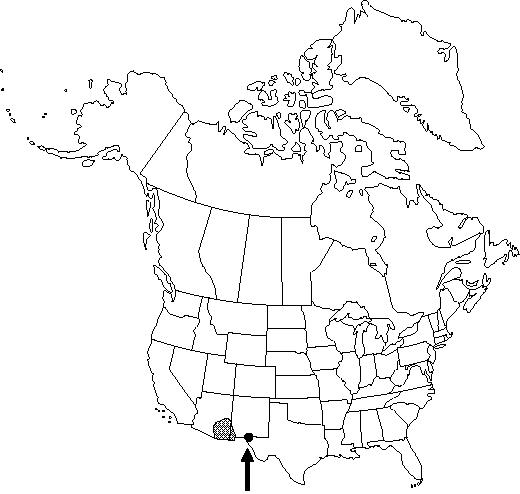Difference between revisions of "Quercus toumeyi"
Gard. & Forest 8: 92. 1895.
FNA>Volume Importer |
FNA>Volume Importer |
||
| Line 14: | Line 14: | ||
|basionyms= | |basionyms= | ||
|synonyms={{Treatment/ID/Synonym | |synonyms={{Treatment/ID/Synonym | ||
| − | |name= | + | |name=Quercus hartmanii |
|authority=Trelease | |authority=Trelease | ||
}} | }} | ||
| Line 31: | Line 31: | ||
|elevation=1500-1800 m | |elevation=1500-1800 m | ||
|distribution=Ariz.;N.Mex.;Tex.;Mexico (Chihuahua and Sonora). | |distribution=Ariz.;N.Mex.;Tex.;Mexico (Chihuahua and Sonora). | ||
| − | |discussion=<p>Quercus toumeyi, particularly the more spinescent-leaved form, is often confused with Q. turbinella. The latter species has acorns on peduncles greater than 10 mm, and more or less evenly distributed minute, flat, stellate trichomes on the abaxial leaf surface, in contrast to the subsessile acorns and longer straight hairs along the midvein of the abaxial leaf surface in Q. toumeyi.</p> | + | |discussion=<p><i>Quercus toumeyi</i>, particularly the more spinescent-leaved form, is often confused with <i>Q. turbinella</i>. The latter species has acorns on peduncles greater than 10 mm, and more or less evenly distributed minute, flat, stellate trichomes on the abaxial leaf surface, in contrast to the subsessile acorns and longer straight hairs along the midvein of the abaxial leaf surface in <i>Q. toumeyi</i>.</p> |
|tables= | |tables= | ||
|references= | |references= | ||
| Line 44: | Line 44: | ||
|rank=species | |rank=species | ||
|parent rank=section | |parent rank=section | ||
| − | |synonyms= | + | |synonyms=Quercus hartmanii |
|basionyms= | |basionyms= | ||
|family=Fagaceae | |family=Fagaceae | ||
| Line 55: | Line 55: | ||
|publication year=1895 | |publication year=1895 | ||
|special status=Selected by author to be illustrated | |special status=Selected by author to be illustrated | ||
| − | |source xml=https://jpend@bitbucket.org/aafc-mbb/fna-data-curation.git/src/ | + | |source xml=https://jpend@bitbucket.org/aafc-mbb/fna-data-curation.git/src/8f726806613d60c220dc4493de13607dd3150896/coarse_grained_fna_xml/V3/V3_395.xml |
|genus=Quercus | |genus=Quercus | ||
|section=Quercus sect. Quercus | |section=Quercus sect. Quercus | ||
Revision as of 17:16, 18 September 2019
Shrubs or small trees, deciduous or subevergreen. Bark dark gray to almost black, scaly. Twigs brownish, 1-2 mm, usually persistently pubescent. Buds reddish brown, ovoid, ca. 1 mm. Leaves: petiole 2-3.5 mm. Leaf blade oblong-elliptic or lanceolate, 15-25(-30) × (6-)8-12(-15) mm, base obtuse or cuneate, rarely subcordate, margins strongly cartilaginous, entire, sometimes sparsely mucronate-dentate toward apex, secondary veins 7-8 on each side, apex acute, sometimes rounded; surfaces abaxially dull gray, microscopically pubescent with long, soft, white or yellow hairs concentrated in tufts along midvein and base, adaxially glossy green, sparsely minutely stellate-pubescent or glabrate. Acorns solitary or paired, subsessile or on peduncle 2 mm; cup cup-shaped, 6 mm deep × ca. 8-9 mm wide, enclosing ca. 1/3 nut, scales moderately tuberculate; nut light brown, narrowly ovoid or elliptic, 8-15 × 6-8 mm. Cotyledons distinct.
Phenology: Flowering spring.
Habitat: Rocky slopes, oak woodlands, and open chaparral
Elevation: 1500-1800 m
Distribution

Ariz., N.Mex., Tex., Mexico (Chihuahua and Sonora).
Discussion
Quercus toumeyi, particularly the more spinescent-leaved form, is often confused with Q. turbinella. The latter species has acorns on peduncles greater than 10 mm, and more or less evenly distributed minute, flat, stellate trichomes on the abaxial leaf surface, in contrast to the subsessile acorns and longer straight hairs along the midvein of the abaxial leaf surface in Q. toumeyi.
Selected References
None.
